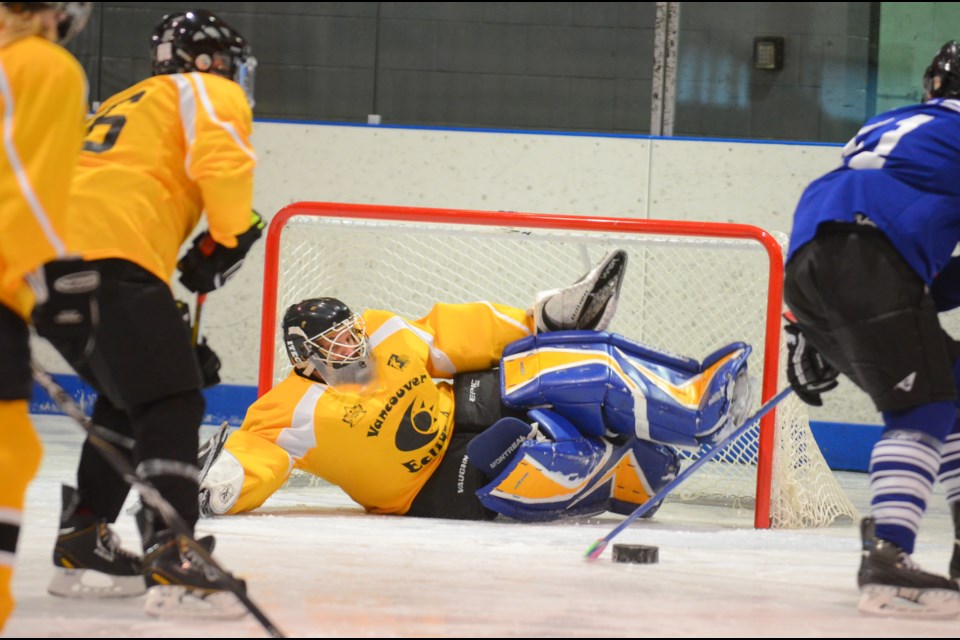They come from across the Lower Mainland, bringing their passion for hockey onto the Moody Park ice once a week.
Canada’s national winter sport bonds them and unites them. So does the fact that each player is visually impaired or completely blind. But their ability and desire to play is stronger than the shadows and darkness that each faces individually.
“What would the word be – I guess it’s freeing,” said New Westminster’s Steve Vandermey of when he overcame his initial fears eight years ago to return to the ice and strap on the pads.
As a member of the Vancouver Eclipse, which hit the ice every Friday morning at Moody Park Arena, Vandermey found a sense of camaraderie, a familiar comfort zone in a game that each could embrace.
Every year, a number of the players trek east for an international tournament which is played on the site of the legendary Maple Leaf Gardens, where a rink fills one of the renovated upper floors.
This year, 15 players from the Eclipse will be making the journey next month, and to help cover costs the team is holding a fundraiser this Saturday (Feb. 13), starting at 7 p.m. at the Paddlewheeler Pub on Quayside Drive, to help raise the approximately $15,000 cost of the trip.
Some subtle changes make the sport accessible for the visually impaired – a larger, metal puck filled with bearings that makes a noise as it slides across the ice, and nets measuring six-feet wide by three-feet high. A sighted player and referee help move the puck along when it comes to a halt.
Faceoffs begin with the referee shaking the puck at centre ice. Once the game starts, the action is quick with the pace like a lot of beer league hockey played in rinks across the continent.
“I’m one of those adult hockey players who didn’t learn to skate backwards like my kids did,” said Burnaby’s Brian Cowie. “I didn’t play hockey while growing up, but I guess it’s that cliché of being Canadian, you want to play hockey.”
Using the international athletic standard for impaired vision, Cowie’s vision is rated as B2 – with some peripheral vision but just above five per cent sight – and qualifies him to ply the open ice at forward.
Vandermey, who uses a guide dog in his everyday life, is completely blind in one eye and can make out light with his other, is a B1 athlete, with little to no vision – which puts him in goal.
“Being among the players with low vision, I’m trying to anticipate what’s going to happen,” said Vandermey. “You’re listening for sounds and the ‘dingle’ of the puck.
“My challenge is the same as every other beer league goalie, of keeping the puck out of the net.”
Although he didn’t play minor hockey growing up in east Richmond, a street over from Queensborough, Vandermey tried the sport as a 15-year-old and chose the net as his spot.
“I played a lot of beer league hockey and as a goalie was always in demand.”
In his mid-30s he began losing his eyesight due to diabetes and has a prosthetic eye now. As the darkness set in, strapping on the pads was just a memory. That is until he heard about the Eclipse.
“You almost feel your life has stopped, or you’re trapped inside your home,” said Vandermey. “Like most people, I heard about (hockey for the blind) and couldn’t imagine it. It seemed scary... I didn’t know what to expect and it took me two years to get me out to try it. I’m glad I found it.”
The visually impaired and legally blind come to the rink to experience that popular boundary of 80-feet by 200-feet and enjoy all that comes with it. Camaraderie is a huge part, but for guys like Cowie, there is the competition as well.
“It’s been a lot of fun, but I’m a pretty competitive guy so there’s that element of competing,” said Cowie, who discovered the Eclipse after hearing a TV news item nearly 20 years ago. “I just love the feel you get from skating on the ice.”
Defencemen and forwards have limited vision but are able to see shapes and the puck, and avoid some of the collisions that come with playing a game at a fast pace.
“I’m not bad at avoiding those collisions,” said Cowie, who has competed in three Paralympic Games as a cyclist.
“My peripheral vision is considered good for someone at (B2), while others have less. My vision has blind spots in the central vision so I can make the puck disappear if I turn a little bit.”
Although goals are scored in a shorter net, the puck still comes flying. Vandermey says the eventual stingers and scrapes are just part of the job.
“It’s the ones that come off the cage that really hurts,” he said. “It comes back off the post pretty hard.”
If anything, the puck appears to take the worst of it, dented and creased from hitting the post. The club goes through about 20 pucks a year, each costing $40.
Still, even while others design a modern puck that beeps, it’s hard to perfect on the simple, tin-can like puck, said Cowie.
“It is kind of archaic and rudimentary but nothing works as good as this one.”
* The Eclipse are continually seeking new players who are B1, B2 or B3 sighted. All players must be able to skate, and can find out more at www.vancouvereclipse.ca.



